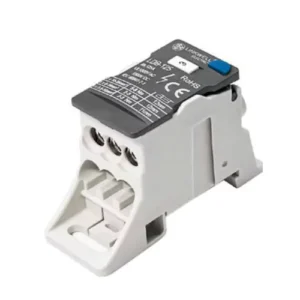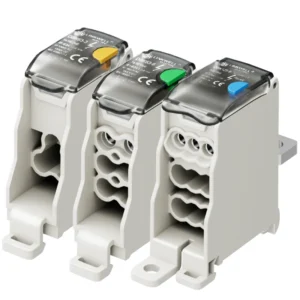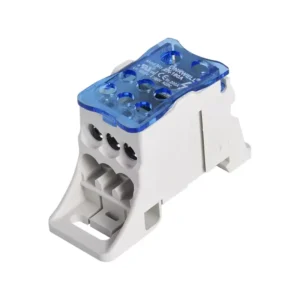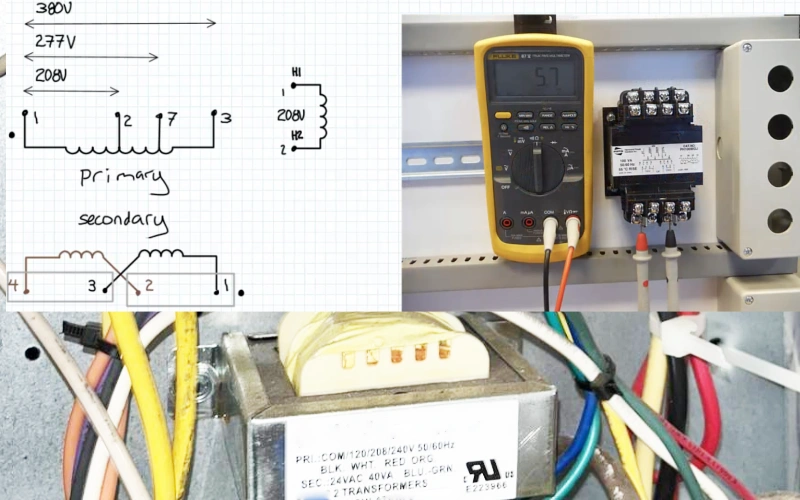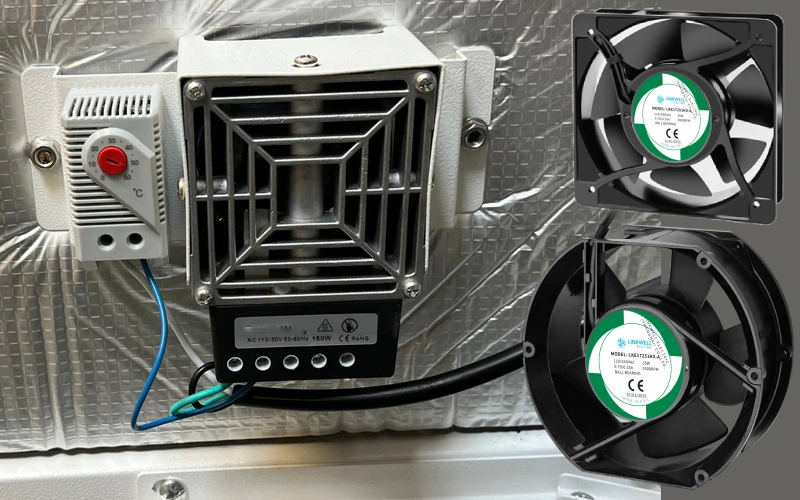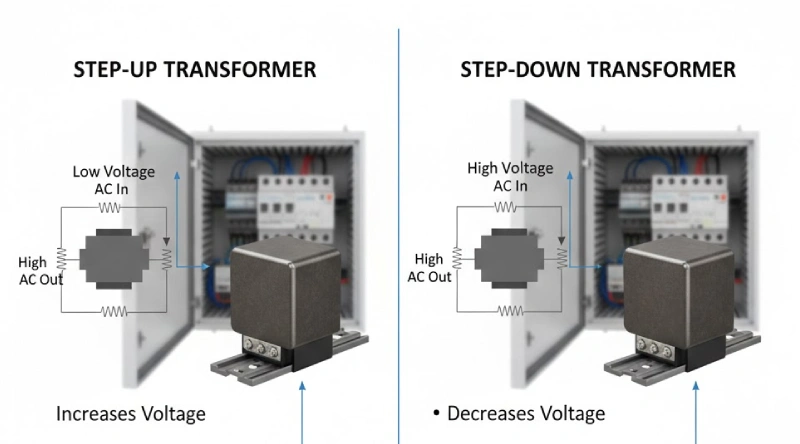If you want to make the most of your control panel space, smart 3-phase terminal block selection is the way to go. With the right choices, you can boost panel density, cut costs, and keep your inventory simple. Did you know high-density 3-phase terminal blocks can save up to 66% of space compared to single-level terminals?
- A 2.5mm² three-level terminal handles 6 conductors in just 5.1mm thickness.
Choosing certified, high-quality products from Linkwell keeps your panels safe and efficient. Maximizing Panel Density: A Wholesaler’s Guide to 3-Phase Terminal Block Selection helps you stay ahead in the industry.
Key Takeaways
- Maximize panel density by choosing high-density terminal blocks. This helps you fit more connections in less space, saving on costs and improving efficiency.
- Select terminal blocks with the right current and voltage ratings. This ensures safety and prevents overheating, keeping your panels reliable.
- Opt for modular designs. Modular terminal blocks allow for easy upgrades and adjustments, making your panels flexible for future needs.
- Always check for certifications like UL and CE. Certified products meet safety standards, helping you avoid compliance issues and ensuring quality.
- Plan your layout carefully. Consider how terminal blocks will fit together to use every inch of space wisely and maintain a neat appearance.
Panel Density Essentials
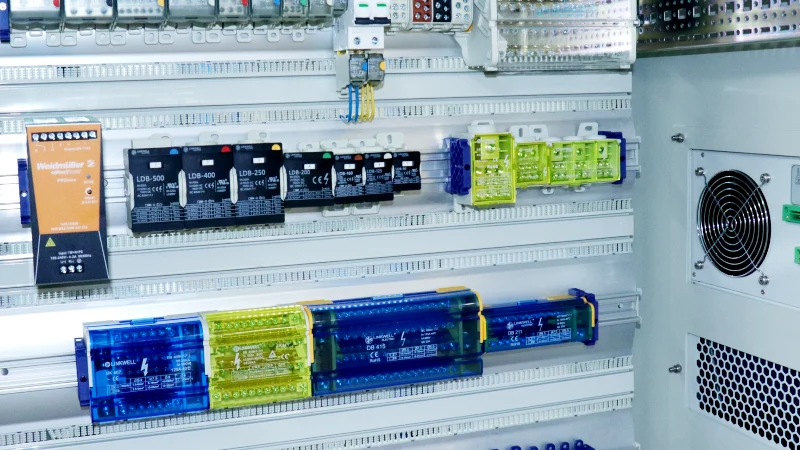
What Is Panel Density?
Panel density is all about how many components you can fit inside your electrical panel without sacrificing safety or performance. When you look at a control cabinet, you want to see neat rows of terminal blocks, wiring ducts, and other accessories. High panel density means you use every inch of space wisely. You avoid wasted gaps and bulky parts. This approach helps you build compact panels that still meet all technical requirements.
Think of panel density like packing a suitcase for a long trip. If you organize your clothes and use smart packing cubes, you fit more in and keep everything tidy. In electrical panels, you do the same with terminal blocks and wiring. You choose products that stack, snap, or mount close together. You get more circuits in less space.
Tip: High-density terminal blocks, like those from Linkwell, let you handle more connections in a smaller footprint. This means you can offer customers panels that are both efficient and easy to maintain.
Why It Matters for Wholesalers
If you’re a wholesaler, panel density affects your bottom line. You want to stock products that help your customers save space and money. When you offer high-density solutions, you stand out from competitors. Your clients get panels that cost less to build and install. They also need fewer enclosures, which means lower shipping and storage costs.
Here’s why panel density should be on your radar:
- Space Savings: You help panel builders fit more circuits into smaller cabinets.
- Cost Efficiency: Fewer materials and less labor mean better margins for you and your customers.
- Streamlined Inventory: You stock modular, stackable products that work for many projects.
- Customer Satisfaction: Your clients get reliable, certified solutions that make their jobs easier.
Maximizing Panel Density: A Wholesaler’s Guide to 3-Phase Terminal Block Selection isn’t just about technical specs. It’s about giving you the tools to grow your business and support your customers with smarter, more efficient panels.
Selection Criteria
When you choose 3-phase terminal blocks, you want to make sure you get the right fit for your panels and your customers. Let’s break down the key things you should look for.
Size and Footprint
Start by checking the size of the terminal block. Smaller blocks help you fit more connections in less space. This is the heart of maximizing panel density. If you use compact options like Linkwell’s Power Distribution Block or Screw Terminal, you can offer panels that are neat and efficient. Always measure your available space and pick blocks that let you use every inch wisely.
Current Rating
You need to match the terminal block’s current rating to your application. If you pick a block with too low a rating, you risk overheating and safety issues. Linkwell’s terminal blocks handle high currents, so you can trust them for demanding jobs. Always check the specs and make sure the block can handle your load.
Modularity
Modular terminal blocks give you flexibility. You can add, remove, or rearrange them as your wiring needs change. This makes your panels easy to upgrade or repair. Linkwell’s modular designs let you build panels that grow with your projects. Here’s what modularity brings to the table:
| Feature | Description |
|---|---|
| Flexibility | Add, remove, or move blocks as needed |
| Reusability | Use components again for new setups |
| Compatibility | Fit different wire sizes and types |
| Space-saving design | Stack and arrange for the best use of space |
Certifications and Safety
Always look for UL and CE certifications. These marks show the product meets strict safety and quality standards. Linkwell’s Power Distribution Block and Screw Terminal both carry these certifications. You get peace of mind knowing your panels are safe and compliant.
- UL certification means the block resists flames and handles heat.
- CE marking shows it meets European safety rules.
Compatibility
You want terminal blocks that work with your existing panel components. This saves you time and avoids costly changes. Linkwell designs its blocks to fit standard mounting rails and wiring setups. When you choose compatible products, you keep your installations smooth and efficient.
Maximizing Panel Density: A Wholesaler’s Guide to 3-Phase Terminal Block Selection becomes much easier when you focus on these criteria. You get panels that are safe, flexible, and ready for any job.
Maximizing Panel Density: A Wholesaler’s Guide to 3-Phase Terminal Block Selection
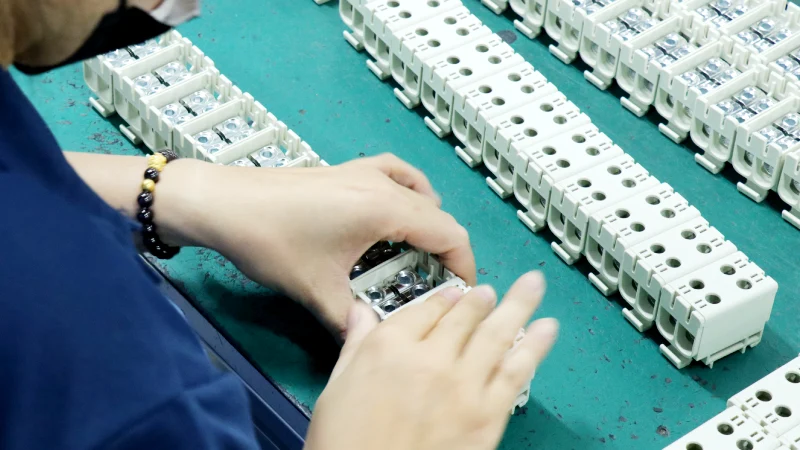
Step-by-Step Process
You want to make every inch of your panel count. Here’s a simple process you can follow to choose the right 3-phase terminal blocks and maximize density:
- Check Current Ratings
Make sure your terminal block can handle at least 1.5 times your highest expected current. This keeps your panel safe and prevents overheating. - Review Voltage Ratings
Pick a block with a voltage rating higher than your circuit. This protects your equipment from damage. - Match Wire Size
Look at your wire gauge. Choose a terminal block that fits your wires perfectly. This avoids loose connections and keeps everything secure. - Plan Orientation and Fit
Think about how you’ll arrange the blocks. Will they stack, snap, or mount side by side? Use your space wisely so you can fit more connections. - Choose Block Structure
Triple-level terminal blocks work great for tight spaces. They let you connect more wires in less room. - Select Wire-Securing Method
Decide if you want screw-in, push-button, or push-in terminals. Pick what works best for your installation and environment. - Verify Compliance Ratings
Look for UL, CE, or IEC marks. These show the blocks meet strict safety standards. - Prioritize Quality
Go for high-quality blocks. Reliable products mean fewer problems down the road.
Tip: Following these steps helps you build panels that are safe, efficient, and easy to maintain. You’ll see the benefits in every project.
Evaluating Linkwell Solutions
When you want to maximize panel density, you need solutions that check all the boxes. Linkwell’s Power Distribution Block and Screw Terminal make your job easier. Let’s see how they stack up against key criteria:
| Criteria | Description |
|---|---|
| Electrical Requirements | Linkwell blocks exceed circuit needs, boosting safety and reliability. |
| Environmental Conditions | Flame-retardant and corrosion-resistant materials handle tough environments. |
| Wire Size | Compatible with a wide range of wire gauges for flexible installations. |
| Mounting Space | Compact design fits tight spaces and supports high-density layouts. |
| Connection Type | Screw terminals offer secure, tool-friendly connections. |
You get more than just a product. Linkwell’s terminal blocks come with global certifications like UL, CE, and RoHS. These marks mean you can trust the safety and quality. The blocks use industrial-grade plastics that resist flames and corrosion. Every unit goes through rigorous testing before shipment.
| Certification/Safety Feature | Description |
|---|---|
| UL, CE, and RoHS Certification | Meets global safety standards. |
| Flame-retardant, industrial-grade plastics | Keeps your panel safe in any environment. |
| Rigorous testing before shipment | Ensures reliability and peace of mind. |
You’ll find installation easy. The modular design lets you add or remove blocks as needed. You can expand or reconfigure your panel without hassle. The Power Distribution Block supports high amperage and works with both AC and DC circuits. The Screw Terminal handles solid and stranded wires, so you get flexibility for any job.
Maximizing Panel Density: A Wholesaler’s Guide to 3-Phase Terminal Block Selection becomes simple when you choose Linkwell. You get certified, modular, and easy-to-install solutions that help you build better panels. Your customers will notice the difference in quality and efficiency.
Recommended products
Common Mistakes
Overlooking Size Constraints
You might think smaller always means better, but size constraints can get tricky fast. When you try to pack more into a tight space, you face new challenges. Compact designs often make it harder to keep electrical performance steady. If you don’t plan carefully, you risk reliability issues. Smaller panels can also make it tough to optimize your circuits. You want to use every inch, but you can’t sacrifice safety or performance.
- Complex shapes may be needed to fit everything, which can complicate your layout.
- Shrinking dimensions can affect how electricity flows, making it harder to maintain stable performance.
- It’s easy to miss small details that could impact reliability when you focus only on saving space.
Tip: Always balance space savings with the need for reliable, easy-to-maintain connections.
Ignoring Certifications
Skipping certifications might seem like a shortcut, but it can backfire. Certified terminal blocks, like those from Linkwell, help you avoid big headaches. If you ignore certifications, you could run into safety violations. Equipment might malfunction because of electromagnetic interference or harmonic pollution. You may also see higher maintenance costs if you don’t follow the rules.
- Safety violations can lead to fines or failed inspections.
- Malfunctions may happen due to interference or poor quality.
- Maintenance costs go up when you use uncertified products.
Note: Look for UL and CE marks to keep your panels safe and compliant.
Neglecting Modularity
If you skip modular designs, you limit your options. Modularity lets you add, remove, or rearrange blocks as your needs change. Without it, you make future upgrades or repairs much harder. You also risk making your panels less flexible for different projects. Modular terminal blocks, like Linkwell’s, help you build panels that grow with your business.
- Easy upgrades and repairs
- Flexible layouts for different jobs
- Better use of space
Installation Errors
Even the best terminal blocks can fail if you install them wrong. Common mistakes include poor contact, loose connections, or bad insulation. These errors can cause unstable current, short circuits, or even equipment failure. You can prevent most issues with a few simple steps.
| Error Type | Description | Prevention Measures |
|---|---|---|
| Poor Contact | Oxidized or loose surfaces cause unstable current. | Inspect and clean contacts before installation. |
| Poor Connection | Wires not secured, leading to poor conductivity. | Strip wires to the right length and tighten them properly. |
| Poor Insulation | Not enough insulation can cause shorts or failures. | Use quality materials and check insulation during setup. |
Remember: Take your time during installation. Double-check every connection to keep your panels running smoothly.
Recommended Solutions
Linkwell Power Distribution Block
If you want to boost panel density, you should start with Linkwell’s Power Distribution Block. This block packs a lot of power into a small space. You get a compact design that saves room in your cabinet. The modular structure lets you scale up or down as your project changes. You can mount it on a 35mm DIN rail or directly on the panel with screws. The see-through, finger-safe cover keeps your wiring visible and protected. You also get high protection ratings, so you can use these blocks indoors or outdoors without worry.
Here’s a quick look at what makes these blocks stand out:
| Feature | Description |
|---|---|
| Space-saving design | Fits more circuits in less space |
| Modular and customizable | Adjusts to your project needs |
| High protection ratings | IP65/IP66 for tough environments |
| Advanced safety features | Emergency stop, interlock, real-time fault checks |
| Easy installation | DIN rail or direct panel mounting |
Tip: The Power Distribution Block uses high-conductivity copper and hex screw terminals for secure, reliable connections every time.
Linkwell Screw Terminal
You need flexibility when building high-density panels. Linkwell’s Screw Terminals give you just that. These terminals work with both solid and stranded wires. The modular design means you can add or remove terminals as your wiring changes. You can choose from different sizes, colors, and labeling options to match your project. If you need something special, Linkwell supports OEM customization. You also get fast delivery and technical support, so your orders arrive on time and your panels stay on schedule.
Check out how these terminals help wholesalers:
| Feature | Benefit |
|---|---|
| OEM customization | Solutions tailored to your needs |
| Flexible options | Sizes, colors, and labels for any project |
| Cost-effective in bulk | Lower costs for large orders |
| Fast delivery | Keeps your projects moving |
| Engineering advice | Expert help for sourcing and design |
High-Density Features
Both the Power Distribution Block and Screw Terminal shine in high-density applications. You get modularity, stackability, and certified safety. The compact footprint lets you fit more connections in less space. Installation is quick and easy, so you save time on every build. Linkwell also supports bulk orders and long-term partnerships, making it easy to keep your inventory stocked and your customers happy.
Note: With Linkwell, you get reliable products, fast shipping, and the flexibility to customize your order. That’s how you stay ahead in the panel-building game.
You can boost efficiency by following a few simple steps: check current and voltage ratings, match wire specs, and plan for space-saving layouts. Certified, modular solutions like Linkwell’s Power Distribution Block and Screw Terminal help you build reliable, high-density panels. Many wholesalers praise Linkwell for quality, customization, and fast support. Take a moment to review your process. If you want expert help or custom options, reach out to Linkwell. Maximizing Panel Density: A Wholesaler’s Guide to 3-Phase Terminal Block Selection makes your next project easier.
FAQ
What is the main benefit of using high-density terminal blocks?
You can fit more connections in less space. This helps you build smaller panels and save on cabinet costs. High-density blocks also make your wiring look neat and organized.
Are Linkwell terminal blocks certified for safety?
Yes! Linkwell terminal blocks carry UL and CE certifications. You can trust them to meet strict safety standards. These marks help you pass inspections and keep your projects compliant.
Can I customize terminal blocks for special projects?
Absolutely. Linkwell offers OEM customization. You can choose sizes, colors, and even labeling. If you have a unique project, just ask for a custom solution.
How do I know which terminal block fits my panel?
Check your panel’s current and voltage needs. Measure the available space. Match wire sizes. If you need help, Linkwell’s team can guide you to the right choice.


